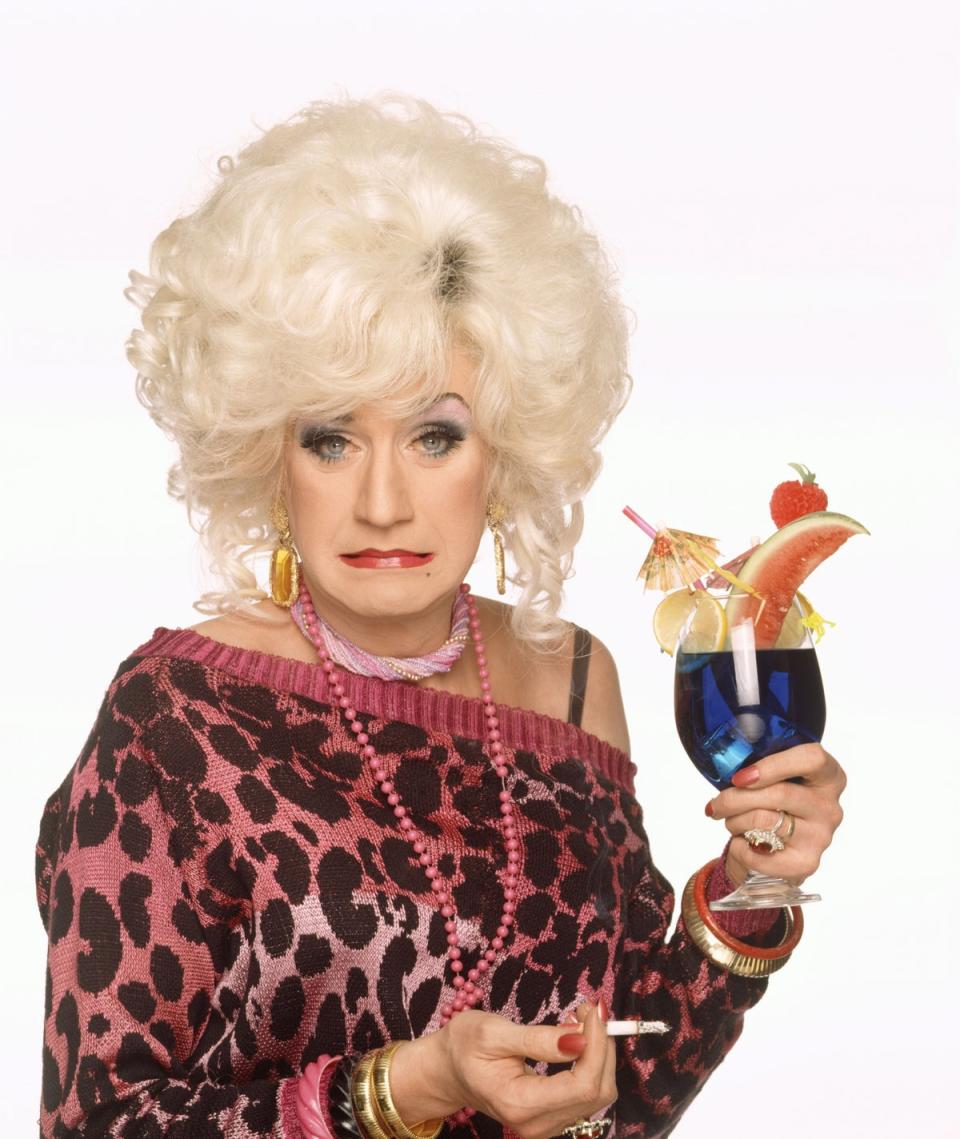The Life and Death of Lily Savage review: Insightful documentary shows swirling duality in Paul O’Grady’s personality
One of the more startling revelations in ITV’s The Life and Death of Lily Savage is that, back in the 1980s, the man behind the drag persona had been a social worker. In a way, it’s even more difficult to envisage than him being an altar boy, an earlier case of tragic miscasting. Entirely untrained and with no previous experience, Paul O’Grady juggled his day job supporting “broken families” with his nocturnal, foul-mouthed Lily Savage, the pub act progenitor of today’s drag boom. As O’Grady described her, Lily was “a hard-bitten hooker from Birkenhead with her roots showing and ripped tights and a big handbag”. A little incongruous at first glance, then.
In archive audio, we hear O’Grady admit that he didn’t enjoy the social work much (“basically a skivvy”),but he was actually a natural at it, and it’s a role that demands compassion and responsibility. There was clearly a tenderness under that gritty exterior, and this swirling duality in O’Grady’s personality, and the secret of his great success, is insightfully explored in The Life and Death of Lily Savage. You find yourself tremendously impressed with O’Grady’s achievements, but there is still an overwhelming sense of sadness that pervades the programme, which arrives on the first anniversary of O’Grady’s death from a heart attack.
The O’Grady/Savage retrospective is told through his own nicotine-drenched words from his many interviews, some early video footage of the pub act and, most movingly, via testimony from his “secret” daughter, Sharon, and his many, many friends and co-stars: Sir Ian McKellen; Gaby Roslin; “renowned homosexual” (his words) Julian Clary, Brenda Gilhooly, Alan Carr, Graham Norton. So, yes, camper than a row of pink tents. The only notable absences, and understandable ones, are O’Grady’s husband, André Portasio, and the most famous old queen in the land, Camilla, who O’Grady bonded with for the love of dogs, so to speak.
For a self-confessed grumpy old sod who made no secret that he performed as Lily purely for the cash, and would often end a phone call with a cheery “f*** off”, O’Grady’s rise to national treasure status was an improbable one. Although there had been famous mainstream drag or “female impersonator” acts before, such as Danny La Rue and Stanley Baxter’s queens, and Barry Humphries’ outrageous Dame Edna Everage (who should not have gone unmentioned in the documentary), it was Lily Savage who emerged from the gay pub circuit, and that was extremely hard work.
The epicentre of that particular scene was the Royal Vauxhall Tavern in south London, and the archive shows Lily doing her thing on stage and in the crowded, sweaty dressing room. While the drag queens might have looked all glam, the changing rooms reeked and there was nothing glamorous about the police raids – but this was merely another opportunity for Savage to go on the attack. There’s a clip of the Labour MP Chris Bryant paying tribute to O’Grady when he died, aged 67 a year ago, and recalling a famous anecdote about police storming the pub and arresting O’Grady. The officers were wearing rubber gloves because they were afraid of contracting HIV from gay men. Lily’s quip as they arrived was, “Oh, lads, you’ve come to do the washing up! That’s great!”
By 1991, Lily Savage was fully developed in every sense (O’Grady’s long slender pins were a help), and she was nominated for the Edinburgh Festival Perrier Award for comedy. Blankety Blank, The Big Breakfast, a 2001 Royal Variety Performance, panto and a ubiquitous national presence soon followed.

The programme clarifies a few mysteries for the casual Savage/O’Grady fan. It’s interesting to learn that O’Grady came up with the name of his act after a bitchy barman saw him canoodling with some Chinese sailors in a Liverpool pub, and made a disparaging remark about “Shanghai Lil”. The “Savage” bit presumably suggested itself. We also see how some of O’Grady’s childhood books were filled with his doodles of exaggeratedly feminine women with big blonde hair and looping eyelashes, something that suggested he didn’t really end up doing drag just for the money. His costumier attests that O’Grady took enormous care in his outfits, and spared no expense as he hit the big time, because as Dolly Parton once said of her own blousy style, “It costs a lot of money to look this cheap.”
The programme also focuses on exactly why O’Grady dropped Savage 20 years ago, and “came out” as himself. It seems to have been that he just got tired of it, literally, as it was so much work to get into character. The death of his long-term partner and manager, Brendan Murphy, also triggers a change of heart. In any case, the mainstream travel series, the chat show and For the Love of Dogs completed the transition from Scouse bombshell to gentle-spoken, sweet-natured gentleman. That said, O’Grady always shared with Savage great affection and respect for carers, pets, and their many viewers and listeners, but combined with a bottomless contempt for Tories, homophobes and the tabloid press (a considerable overlap there, of course). And that, it seems, is why so many of us miss Paul and Lily so much, and find ourselves a little teary when the curtain comes down.

 Yahoo Lifestyle
Yahoo Lifestyle 
